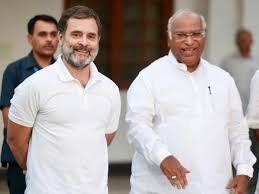LOPs Rahul Gandhi, Kharge write to PM Modi seeking J&K statehood legislation in Monsoon Session of Parliament

Congress leaders Rahul Gandhi and Mallikarjun Kharge have urged Prime Minister Narendra Modi to bring a bill restoring full statehood to Jammu and Kashmir. They made this appeal in a joint letter ahead of the upcoming Monsoon Session of Parliament, scheduled to begin on July 21, 2025.
They also requested legislation to include Ladakh under the Sixth Schedule of the Constitution, which grants special protections to tribal communities.
Congress Terms J&K Downgrade Unconstitutional
In the letter, Gandhi and Kharge said the 2019 decision to downgrade Jammu and Kashmir into a Union Territory violated democratic norms. They called it an act “without precedent in independent India.” The leaders urged the Centre to reverse this move by passing appropriate legislation during the Monsoon Session.
They emphasized that Jammu and Kashmir had joined India through a special constitutional arrangement, and taking away its statehood weakened that historical bond.
Modi’s Past Assurances Cited
The Congress leaders reminded PM Modi about several promises made since 2019. In May 2024, Modi called the return of J&K’s statehood a “solemn promise” during an interview in Bhubaneswar. He repeated this commitment at a rally in Srinagar in September 2024, saying the region would regain its statehood.
The letter also highlighted the government’s submission before the Supreme Court in December 2023, where it promised to restore statehood “as early as possible.” Gandhi and Kharge urged the Prime Minister to act on these commitments without further delay.
Why Statehood Matters to J&K
After the revocation of Article 370 in August 2019, the central government divided the region into two Union Territories—Jammu and Kashmir, and Ladakh. Officials in Delhi have since handled most administrative functions.
Congress argues that this centralization has weakened democracy in the region. It believes that restoring statehood will empower local leaders and strengthen the people’s trust in the system.
Rahul Gandhi had raised this issue during his Bharat Jodo Yatra and Yatra 2.0. He met citizens in Srinagar and said their voices should matter as much as anyone else’s.
Push for Sixth Schedule in Ladakh
Besides statehood, the Congress also urged the government to protect Ladakh’s tribal identity through constitutional means. The Sixth Schedule of the Constitution provides for autonomous councils, which give tribal areas greater control over local governance.
Local groups like the Leh Apex Body and Kargil Democratic Alliance have long demanded these protections. In 2022, the National Commission for Scheduled Tribes also recommended that Ladakh be added under the Sixth Schedule. Nearly 90% of Ladakh’s population belongs to tribal communities.
The Congress said the people of Ladakh felt isolated after the bifurcation. It stressed the need for safeguards that would protect their culture, land, and jobs.
Opposition Sets the Agenda for Monsoon Session
The joint letter signals that the Congress plans to make Jammu and Kashmir a major topic in the Monsoon Session. After its improved performance in the 2024 Lok Sabha elections, the party wants to hold the government accountable on key issues.
Kharge and Gandhi said the time for promises had passed. They urged the Centre to bring concrete legislation and restore the democratic rights of the people in both J&K and Ladakh.
What Will the Government Do?
Although Home Minister Amit Shah and Prime Minister Modi have spoken about statehood before, there has been no clear timeline. The government has cited the need to complete delimitation and update voter rolls before holding elections in Jammu and Kashmir.
So far, no official word has confirmed whether a bill for statehood will be introduced in this session. The Congress hopes its public pressure will force the government to act.
Conclusion: A Test of Federalism and Trust
The demand for J&K’s statehood and Ladakh’s constitutional protection is more than a political issue. It touches the core of India’s federal structure and democratic values. The Centre’s decision in 2019 sparked debate across the country, and now the time has come for Parliament to revisit that choice.
Restoring statehood and tribal protections could rebuild trust and signal a commitment to constitutional principles. Ignoring the issue may deepen the divide between Delhi and two of India’s most sensitive regions.e Centre chooses to ignore the appeal, it risks further criticism for democratic backsliding. On the other hand, engaging in a meaningful debate and acting on the restoration of statehood and constitutional protections could mark a new chapter of reconciliation and trust-building between the Union and two of its most sensitive regions.






